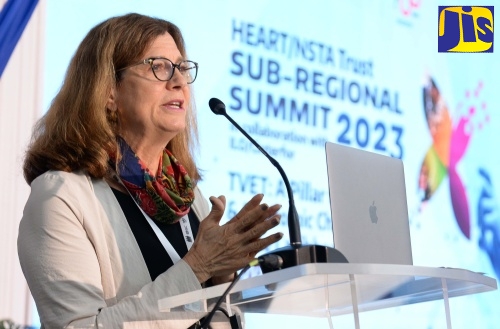Importance of Technical and Vocational Education and Training Underscored
By: , November 23, 2023The Full Story
Minister without Portfolio in the Office of the Prime Minister with Oversight for Skills and Digital Transformation, Senator Dr. the Hon. Dana Morris Dixon, is urging parents to encourage their children to pursue careers in Technical and Vocational Education and Training (TVET).
She said the view that TVET is only pursued by students who did not succeed on the traditional educational path is a false narrative.
“The only way that we are going to be successful in that rebranding is if we actually rebrand the way we deliver our courses and have courses that are more relevant to the future,” Senator Morris Dixon said.
She delivered the keynote address during Wednesday’s (November 22) HEART/NSTA Trust Sub-Regional Summit 2023, held in collaboration with the International Labour Organization (ILO)/Cinterfor, at the Spanish Court Hotel in Kingston.
The Sub-Regional Summit was held under the theme ‘TVET: A Pillar for Social and Economic Change in the Caribbean’.
Noting that TVET is a strategic tool for empowerment, economic diversification and sustainable development, Senator Morris Dixon said a skilled workforce is the backbone of a thriving economy.
“By enhancing our TVET system, we’re not just empowering individuals with skills and knowledge, we’re fuelling economic growth and fostering social change. Our commitment extends to promoting inclusivity in TVET, ensuring that everyone, regardless of their background, has access to quality education and training,” she added.
Pointing to the removal of tuition and administrative fees for programmes up to level four (associate degree) at the Human Employment and Resource Training/National Service Training Agency (HEART/NSTA) Trust, the Minister stated that the inability to afford a TVET programme is not an excuse for Jamaicans.
Senator Morris Dixon highlighted that the human capital index of the Caribbean shows that, on average, 50 per cent of the region’s citizens will not reach their full potential in their lifetime.
“We must focus on increasing investment, enhancing policy support and fostering international cooperation to strengthen our training systems. As leaders, policymakers, educators and trainers, it is our collective responsibility to support these programmes and ensure they continue to evolve and meet the needs of our youth and our economies,” she charged.
For her part, Director of the Inter-American Centre for Knowledge Development in Vocational Training at ILO/Cinterfor, Dr. Anne Posthuma, said the ILO is committed to expanding support to TVET institutions in the English-speaking Caribbean.

“A strong TVET system is an effective driver of social and labour inclusion among segments of the population with greater difficulty to access decent work, such as young people, women, people with disabilities and those from lower socio-economic conditions,” she explained.
Dr. Posthuma added that the provision of TVET that builds quality skills for the future of work is a key component in the response to the digital, environmental and demographic transitions under way globally.





